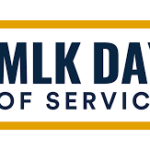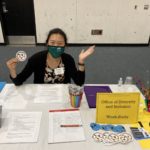By Rachel Bartholomew – AmeriCorps Member at Middlebury College
(Re)Building an Engaged Community

It’s hard to discuss the state of higher education without acknowledging the impact of COVID-19 on. Even with many schools finishing their 2021-2022 school year in person, institutions are still grappling with the question: “What will our campus community look like now?” 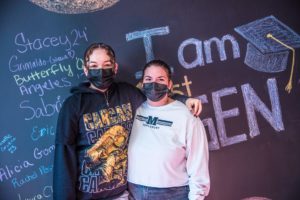 There are students who have been enrolled for two years and are just stepping foot onto campus for the first time. Some student groups, including many multicultural groups, have gone dormant because of low membership. More students are experiencing increased financial need, food and housing insecurity, and mental health crises. All these elements have had a disproportionate impact on students historically undersupported in higher education– low-income, first-generation, LGBTQ+, and students of color.
There are students who have been enrolled for two years and are just stepping foot onto campus for the first time. Some student groups, including many multicultural groups, have gone dormant because of low membership. More students are experiencing increased financial need, food and housing insecurity, and mental health crises. All these elements have had a disproportionate impact on students historically undersupported in higher education– low-income, first-generation, LGBTQ+, and students of color.
Overall, student engagement with the campus community has suffered.
Middlebury College, where I am completing my year of service, is located in rural Vermont. The student body and surrounding community are primarily white, with drastic income inequality amongst students. Even as an opportunity and resource-rich campus with highly capable and driven students, it has been difficult to foster a sense of belonging for marginalized students.
The Anderson Freeman Resource Center, the multicultural center on campus, offers an array of programs, resources, and advocacy for students, helping them develop a personal, social, and academic sense of belonging at Middlebury. The center serves low-income, first-generation, LGBTQ+, and students of color, as well as any other student groups who have historically been marginalized in U.S. colleges and universities. With all-new staffing, it has been a year of strategic planning and imagining a new vision for the center. It was a year of experimentation. Although I worked primarily as the First-Generation Program Coordinator, I assisted with program execution in other areas as well, learning about student outreach, the logistics of planning, and barriers to access.
Some of our programming for the year included:
- First@Midd: Middlebury College’s pre-orientation program for incoming first-generation students. This program introduces students to useful resources and offices, builds community, and helps students adjust to life in college.
- Open Houses
- Tabling at student events
- Excursions to local Vermont sites
- National First-Generation College Celebration: All-day events including a grab-and-go breakfast, social media campaign, library display, and a “Bake-and-Mixer” for students and faculty.
- Finals stress busters, events, and parties
- “Next Steps Week:” A series of workshops and panels geared towards helping students learn about summer opportunities, FASFA, applying to graduate school, and the graduate school experience.
- First-Generation Students Graduation and Lavender Graduation (LGBTQ+ students)
Much of this year has been trial and error. 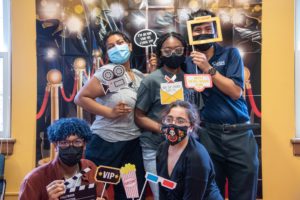 There have been times when no students have shown up to events; some programs never made it out of the planning stages. However, our office is using the lessons we have learned and our growing relationships with other campus community partners to design better initiatives and high-impact programming for the 2022-2023 school year. Some initiatives include: building a divisional shared calendar to streamline programming and working with other orientation groups to have a collaborative and cohesive orientation experience. We are also fine-tuning event timelines to better match student needs, publishing a comprehensive online student guide, refreshing the center’s physical space to be more welcoming, and so much more.
There have been times when no students have shown up to events; some programs never made it out of the planning stages. However, our office is using the lessons we have learned and our growing relationships with other campus community partners to design better initiatives and high-impact programming for the 2022-2023 school year. Some initiatives include: building a divisional shared calendar to streamline programming and working with other orientation groups to have a collaborative and cohesive orientation experience. We are also fine-tuning event timelines to better match student needs, publishing a comprehensive online student guide, refreshing the center’s physical space to be more welcoming, and so much more.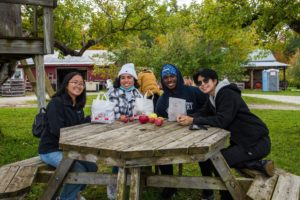
I volunteered with AmeriCorps as a way to serve my community, as well as gain experience in the higher education field. After earning my M.Ed. in Higher Education Administration, I wanted to work in student affairs and diversity, equity, and inclusion (DEI) offices because I am interested in student identity development and belonging. 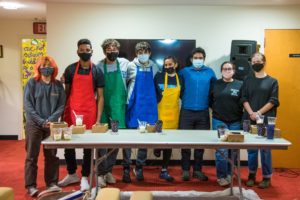 AmeriCorps has ignited my interest in high-impact practices that foster students’ sense of belonging, and I learned a lot about the importance of having consistent student engagement opportunities that are built around the major milestones of the college experience.
AmeriCorps has ignited my interest in high-impact practices that foster students’ sense of belonging, and I learned a lot about the importance of having consistent student engagement opportunities that are built around the major milestones of the college experience.
After service, I will be starting in a position with residential learning community programming at a public university. As I begin my career as a higher education professional, I will be looking for ways to make my programming more engaging and intersectional. I am excited to learn more about student support, appreciative advising, and supervision.
Rachel Bartholomew (they/them) is a 2021-2022 AmeriCorps Member at Middlebury College’s Anderson Freeman Resource Center. During their time with Middlebury College, they took and shared over 1,000 cat pictures (probably) with colleagues, students, and anyone with eyeballs.
